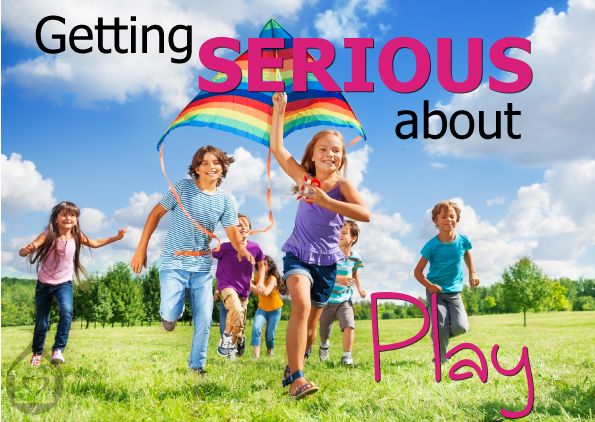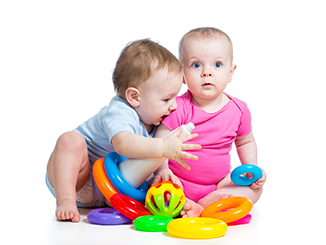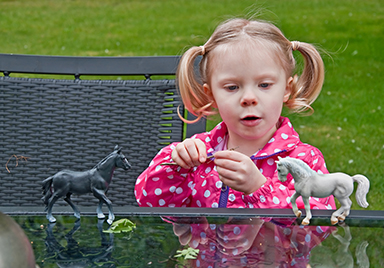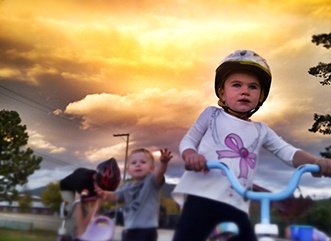Getting Serious about Play

What are your childhood memories?
I immediately think of happy times playing in the garden, building cubbies out of cardboard boxes, climbing trees, inventing adventure games and baking cakes in the sandpit.
Research shows that simply playing is key to a child’s cognitive, emotional and social development.
According to Professor Gray, a Professor of Psychology at Boston College, the drastic reduction in children’s play in Western societies can have life-long consequences for children in terms of literacy, creativity, social acumen and mental health.
Leading developmental psychologists and educators agree that play is critical to children.
At the recent Young Mind’s conference in Sydney, the consensus was that carefree and unstructured afternoons are more important for a child’s development than tight timetables of structured after-school activities, play dates and year-around organized sport. Professor Howard Garner, renowned educator and Professor of Cognition and Education at the Harvard Graduate School of Education, asserts that play is an important medium for formal and informal learning that is much undervalued in today’s society.
So what exactly is play?
A basic definition is that play is a ‘process that is freely chosen, personally directed and intrinsically motivated’. Play provides the real learning playground where children learn essential life skills such as social and emotional intelligence.
Through interaction with their peers, children learn how to socialize, negotiate, clearly communicate, solve conflicts, show initiative and demonstrate leadership.
Play gives children the freedom to be who they are.
It allows them to discover their likes and dislikes, strengths and weaknesses, which helps them to master their lives independently. Play gives children an opportunity to engage in healthy risk taking where they can learn new skills in their own time without experiencing external pressures. In play children face uncertainty, which teaches children to be resourceful, think creatively, improvise and make decisions for themselves.
The Upside of Failure
It is about learning through experiences and failure, which according to Dr Wendy Mogul, the author of The Blessing of a Skinned Knee is absolutely necessary if we want our children to be resilient and exert control over their own lives. Through play experiences children learn and hone their skills helping them to build confidence and self-esteem. Play enables children to find and pursue their own interests which in turn develops intrinsic motivation, a driver for academic learning.
The Neurology of Play
Play is fun. It is the most natural source of happiness. If children engage in pleasurable play activities, their brains release powerful chemicals leading to repetitive behaviours that strengthen synaptic connections. Stronger connections allow the brain to focus on new learning experiences, refining new synaptic connections and making them permanent. Not only does play foster brain growth, but it also assists in the development of self-regulation such as controlling one’s emotions, impulses, behaviour and other cognitive processes.
Children who engage in open-ended and self-directed play are more focused on academic tasks.
Home: the Place of Play
The volume of recent research shows that children perform better academically and socially when they come from home environments that have provided ample opportunity to play freely.
Play is also very physical which is fundamental for the development of children’s gross motor and fine motor skills. When children move around they refine their motor skills, gain better spatial awareness, balance, co-ordination and general awareness of their bodies. Children playfully learn about the law of physics such as heights, speed, distance, space and so on.
Moreover, moving around during play not only reduces obesity, it exercises the brain. Many studies in neuro-science have proven the direct relationship between movement, cognitive and linguistic development. Every sensory input that the child experiences through moving about helps the brain to build and hardwire new neural connections that are related to a particular experience.
“When walking my young daughter to the corner shop recently, I impatiently berated her at least five times to ‘hurry up’. When she wanted to balance on the fence or look at the caterpillar on the path or pick some daisies, I scolded her and hurried her on. We arrived flustered, made our purchase and hurried home. When I read another mother’s reflections on slowing down, I realized how my impatience was harmful. In my haste to get whatever I needed done, I was depriving my daughter of precious exploration time and I was depriving myself of the joy of watching her discover the world. I decided to surrender my ‘haste’ and to commit to just being present to her exploration. It truly transformed our relationship and put things in perspective. So what that the sheets weren’t ironed, or the shelves dusted and the playroom is a mess? My little girl knew I loved her, delighted in her and that she was more important than my to-do list.” – Francine
Smart Kids Play
What amazes me is that we spend hours debating school choices and academic outcomes. We think that money buys us smart children. We allow ourselves to be overwhelmed by micro-managing our children’s before and after school activities when life could be much simpler. Yet, we overlook the powerfulness of something that is given to our children naturally and freely from birth: play. It is through play that children acquire fundamental skills that they need for academic pursuits whilst becoming happy and well-adjusted creative thinkers.
These are survival skills that are needed to deal with global challenges in a fast changing world where nobody can predict the jobs of the future. In the wake of rapidly increasing depression rates and declining social literacy, it is time to make play a priority.
Author: Susanne North is a Family Educator at St Margaret Mary’s North Randwick. She is trained in Early Childhood Rudolf Steiner Education and is currently undertaking further studies in Early Childhood Education at Macquarie University.
What do you think? What are your favourite memories of your childhood play time? What do you do to encourage your kids to get out and play? Tell us in the comments below.
This article featured in the November 2013 edition of the CathFamily e-Magazine. For more check out:
- SmartLoving: Couple Play
- Boredom Busters (Pinterest)
- Over-Scheduled Kids



